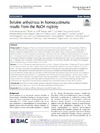Identificador persistente para citar o vincular este elemento:
https://accedacris.ulpgc.es/jspui/handle/10553/69845
| Título: | Betaine anhydrous in homocystinuria: Results from the RoCH registry | Autores/as: | Valayannopoulos, Vassili Schiff, Manuel Guffon, Nathalie Nadjar, Yann García-Cazorla, Angels Martinez-Pardo Casanova, Mercedes Cano, Aline Couce, Maria L. Dalmau, Jaime Peña-Quintana, Luis Rigalleau, Vincent Touati, Guy Aldamiz-Echevarria, Luis Cathebras, Pascal Eyer, Didier Brunet, Dominique Damaj, Léna Dobbelaere, Dries Gay, Claire Hiéronimus, Sylvie Levrat, Virginie Maillot, François |
Clasificación UNESCO: | 241010 Fisiología humana 320903 Evaluación de medicamentos 3210 Medicina preventiva |
Palabras clave: | Betaine Anhydrous Efficacy Homocystinuria Roch Registry Safety |
Fecha de publicación: | 2019 | Publicación seriada: | Orphanet Journal of Rare Diseases | Resumen: | Homocystinuria (RoCH) is a non-interventional, observational, multi-centre, post-authorization safety study that aimed to identify safety of betaine anhydrous (Cystadane®) in the treatment of patients with inborn errors of homocysteine metabolism (homocystinuria) in order to minimise the treatment associated risks and establish better knowledge on its clinical use. The registry included patients of all ages with homocystinuria who were treated with betaine anhydrous in conjunction with other therapies. Clinical data were collected retrospectively from 2007 to 2013, then prospectively up to February 2014. All adverse events (AEs) reported during the study were recorded. The clinical and biological status of patients was monitored at least once a year. Results: A total of 125 patients with homocystinuria (adults [> 18 years]: 50; paediatric [≤18 years]: 75) were enrolled at 29 centres in France and Spain. Patients were treated with betaine anhydrous for a mean duration of 7.4 ± 4.3 years. The median total daily dose of betaine anhydrous at the first and last study visits was 6 g/day for cystathionine β-synthase (CBS)-deficient vitamin B6 responders and 9 g/day for methylenetetrahydrofolate reductase-deficient patients, while the median daily dose increased in CBS-deficient B6 non-responders (from 6 to 9 g/day) and cobalamin metabolism-defective patients (from 3 to 6 g/day) between the first and last visits. Treatment caused a mean overall reduction of 29% in plasma homocysteine levels in the study population. A total of 277 AEs were reported during the study, of which two non-serious AEs (bad taste and headache) and one serious AE (interstitial lung disease) were considered to be drug related. Overall, betaine anhydrous was well tolerated with no major safety concerns. Conclusions: Data from the RoCH registry provided real-world evidence on the clinical safety and efficacy of betaine anhydrous in the management of homocystinuria in paediatric and adult patients. | URI: | https://accedacris.ulpgc.es/handle/10553/69845 | ISSN: | 1750-1172 | DOI: | 10.1186/s13023-019-1036-2 | Fuente: | Orphanet Journal Of Rare Diseases [ISSN 1750-1172], v. 14, (1), (Marzo 2019) |
| Colección: | Artículos |
Citas SCOPUSTM
21
actualizado el 08-jun-2025
Citas de WEB OF SCIENCETM
Citations
16
actualizado el 15-feb-2026
Visitas
70
actualizado el 10-ene-2026
Descargas
57
actualizado el 10-ene-2026
Google ScholarTM
Verifica
Altmetric
Comparte
Exporta metadatos
Los elementos en ULPGC accedaCRIS están protegidos por derechos de autor con todos los derechos reservados, a menos que se indique lo contrario.
